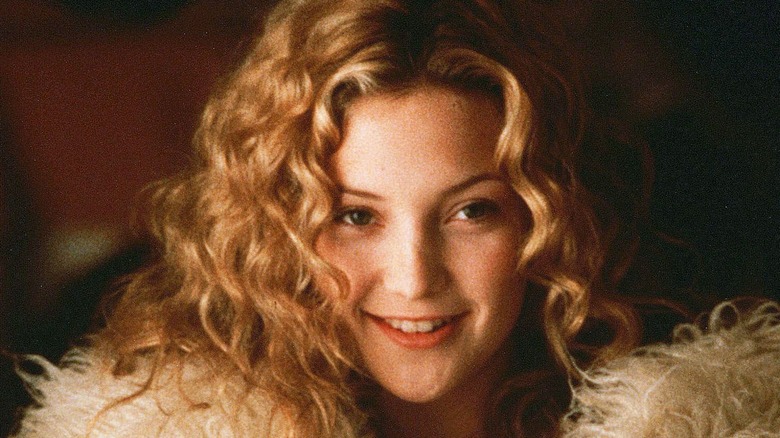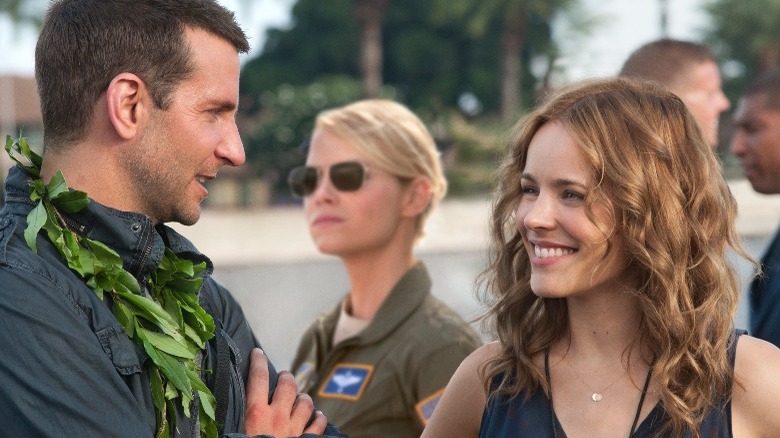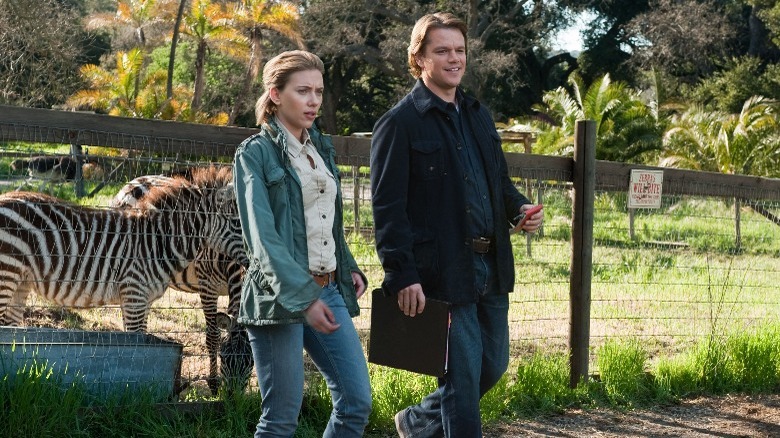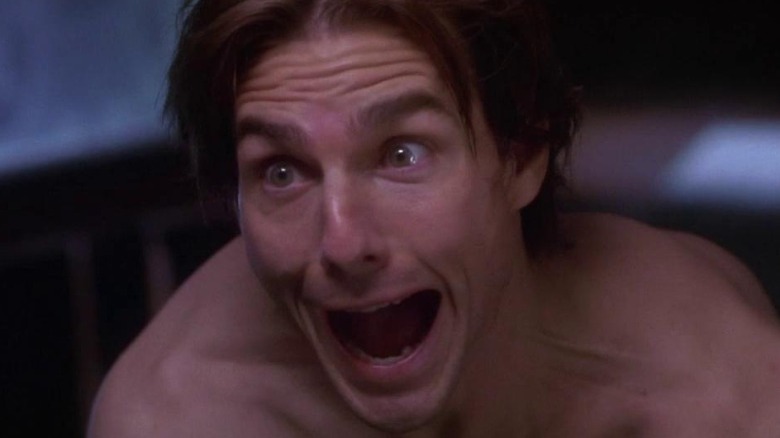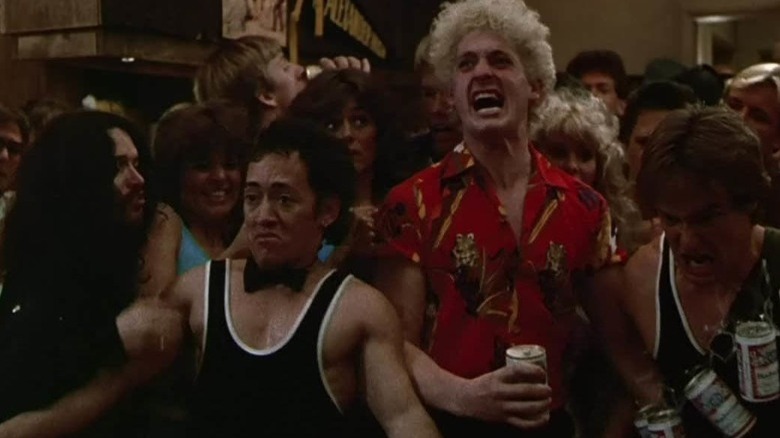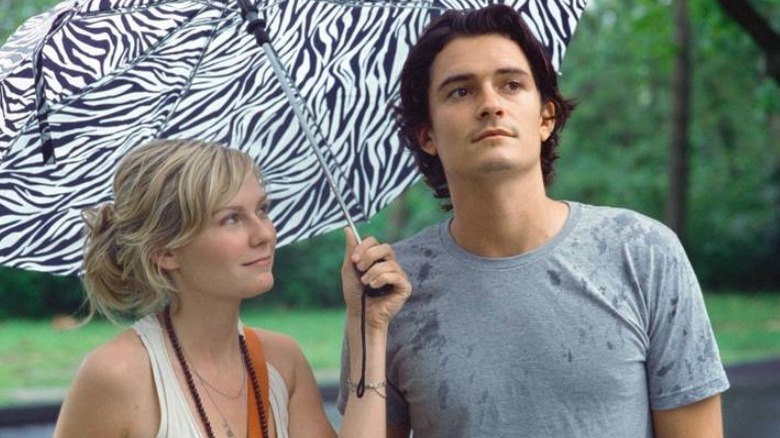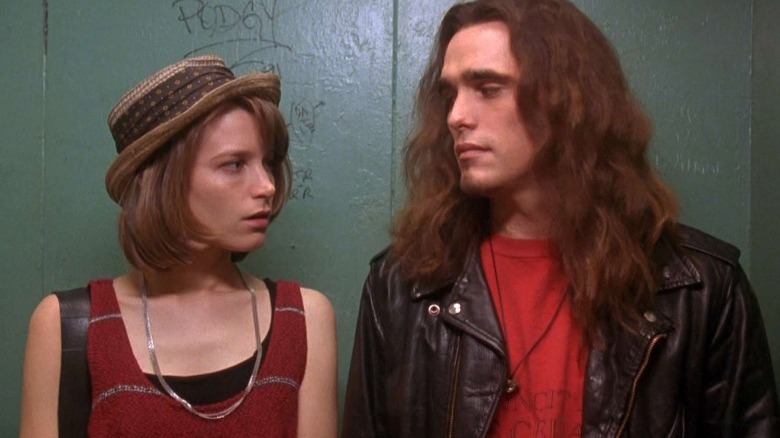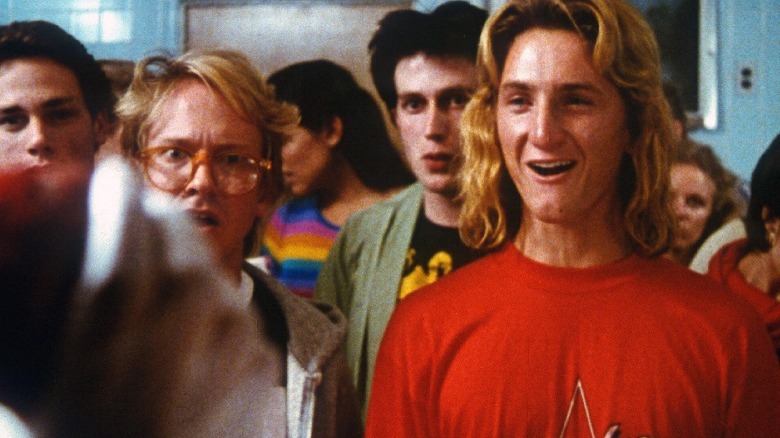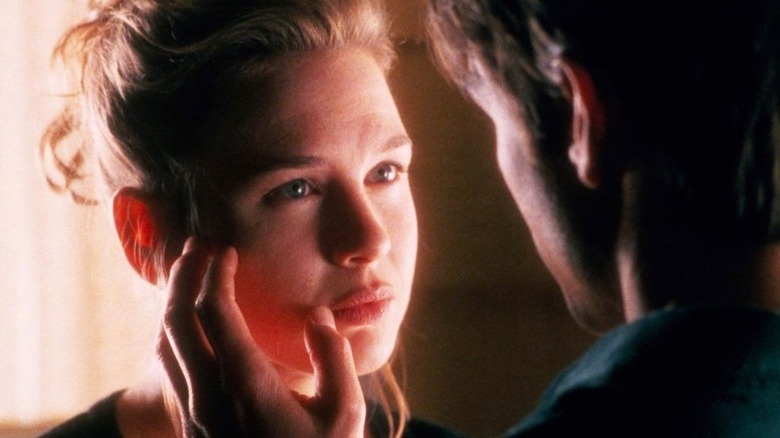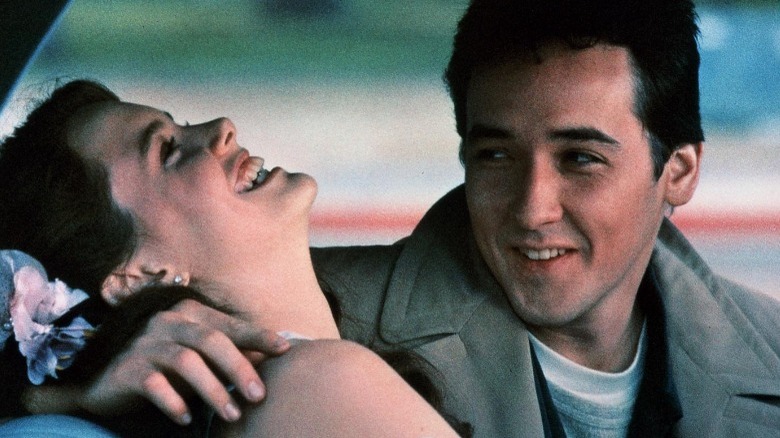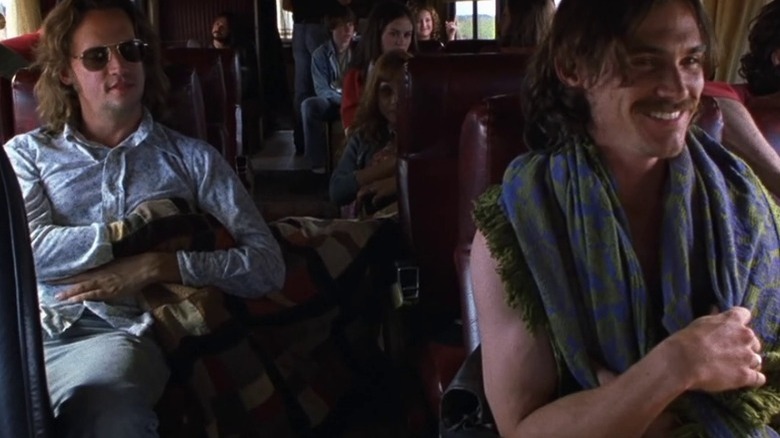Every Cameron Crowe Movie Ranked From Worst To Best
Cameron Crowe makes earnest movies. It's his biggest strength and his biggest weakness. Crowe works best when his obsessions align — when there's the right music, when the romance overwhelms, and when his characters are thoroughly sketched. His films allow for moments of great sentimentality; when Crowe pulls it off, he makes you wonder how he stripped you of your vulnerabilities with a heartfelt speech or the perfect needle drop. When he doesn't, it creates an effect similar to that of watching a bad musical.
Cameron Crowe has had a long career. Before making movies, Crowe was a rock and roll journalist, and his passion for music seeps into his most successful films, from the entirety of "Almost Famous" to key scenes in "Jerry Maguire." His Hollywood career started with his great script for "Fast Times at Ridgemont High," and he quickly moved on to writing, producing, and directing his own films, becoming an auteur in his own right. Crowe is an undeniably talented writer, but he is also an gifted director with an eye and an ear for the cinematic. While Crowe has directed a variety of music videos and documentaries, to make this list more cohesive, we've stuck to Crowe's full-length features. Here is every Cameron Crowe movie, ranked from worst to best.
10. Aloha
Like many filmmakers, Crowe's early films tend to be his best. By contrast, "Aloha" is Crowe's worst effort. It follows Brian Gilcrest (Bradley Cooper), a retired US Air Force Officer who returns to Hawaii and is put in charge of launching a weapons satellite. He reconnects with Tracy (Rachel McAdams), his former lover, who is now married, and is forced to spend time with Allison (Emma Stone), a grating fighter pilot. A love triangle ensues, and neither Cooper nor Stone nor the great McAdams are able to keep the film from going off the rails. Cooper and Stone, tasked with carrying the film's main love story, seem to be acting in different films; Cooper brings too little to the table, and Stone tries too hard to make up for it.
On paper, "Aloha" is a Cameron Crowe film through and through. Much like "Jerry Maguire," it follows a guy who is dissatisfied with his life, who gets an opportunity for a second chance, and who meets a girl that shows him that he could be a better man. Crowe is capable of capturing the natural spark that exists between both lovers and friends, but in "Aloha," the pieces simply aren't there. Add Emma Stone's unfortunate casting as Allison Ng, a woman who's supposed to be one-quarter Hawaian, and "Aloha" is a recipe for disaster.
9. We Bought a Zoo
"We Bought a Zoo" is one of the few Cameron Crowe films that isn't based on an original idea. Drawing on the memoir of the same name by Benjamin Mee, Crowe adapted the script himself, adding a few twists and turns to the story of a widowed man who buys a zoo as a way of regaining control of his life. From the plot alone you can see what drew Crowe to the story: It's about a charming guy who's going through a crisis and is looking for redemption. There are also some adorable kids.
With a cast led by Matt Damon, Scarlett Johansson, and "Almost Famous" star Patrick Fugit, "We Bought a Zoo" is one of Crowe's better late career films. Still, it's permeated by a sense of inevitability, as if there are no stakes. No matter what happens on screen, you know that everything will be resolved neatly by the end. Crowe moves Mee's story from England to Southern California, adds a beautiful love interest, and throws a wrench in the hero's plans. While Crowe manages to get great efforts from his actors — especially Damon, who turns in a sharp and tender performance — that's about it for "We Bought a Zoo." Still, for Cameron Crowe completists and viewers who are able to lower their emotional guards, it's not a bad ride.
8. Vanilla Sky
"Vanilla Sky" is Cameron Crowe's most experimental movie. It's a film that could stand next to "Mulholland Drive," leaving plenty of matters up to interpretation and full of moments that make you wonder if what you're watching is real or not. But, while David Lynch thrives on the unknowable, Cameron Crowe is a different kind of filmmaker. Based on Alejandro Amenabar's "Open Your Eyes," "Vanilla Sky" follows David Aames (Tom Cruise), the disfigured owner of a publishing company who kicks the film off by telling his story to his psychologist as he serves time in jail.
Filled with twists and turns and a memorable love triangle between Cameron Diaz, Tom Cruise, and Penelope Cruz, who reprises in the role she originated in the Spanish version of the film, Crowe crafts a movie that's one part love story, one part science fiction, and one part confusion. While it's thoroughly entertaining, as "Vanilla Sky" reveals twist after twist you can't help but wish for a simpler plot, something that would allow us to dwell with the themes and ideas that are clearly there, waiting to be explored.
7. The Wild Life
A spiritual sequel of sorts to "Fast Times At Ridgemont High," "The Wild Life" is a very '80s movie, one that casually stars Sean Penn's brother, Christopher Penn. Like many of Crowe's films, especially his early ones, "The Wild Life" features an ensemble cast and focuses on the high school experience, specifically that of teens who grew up in California during the '80s.
"The Wild Life" follows a variety of teens on the verge of adulthood, primarily Bill (Eric Stoltz), who just graduated high school, and his younger brother Jim (Ilan Mitchell-Smith), who's obsessed with the Vietnam War. Despite all of this appealing material, the film's director, Art Linson, has a less skilled hand than Amy Heckerling, who directed "Fast Times" with style and humor and elevated Crowe's script into a movie that we're still discussing today.
"The Wild Life" features a star-studded cast, but with his screenplay, it feels like Crowe is retracing his steps. While casting Christopher Penn is a fun nod to "Fast Times," "The Wild Life" seems like it's trying to recapture the magic of Crowe's earlier film without putting in the necessary effort.
6. Elizabethtown
"Elizabethtown" is the clearest example that, while most of Crowe's films are filled with fluff and sweetness, there's often a surprising sadness lurking beneath the surface. Drew Baylor (Orlando Bloom) is a young and successful shoe designer, who, like most of Cameron Crowe's heroes, finds himself in a very low place. Drew just lost his job and his vain girlfriend, and is considering committing suicide when he learns of his father's sudden death. He boards a plane and meets Claire (Kirsten Dunst), a talkative flight attendant.
The problem with "Elizabethtown" lies in its ambition, which is also something worth admiring. The film is over two hours long and follows Drew for a week, during which he swings between emotions — he experiences grief, falls in love, and more. The big shifts make the film difficult to get a hold on, like it doesn't know what it wants to be. A briefer runtime and a more centered narrative might have helped the characters shine a bit more, giving the love story space to grow organically while still allowing the family scenes to land.
Still, Kirsten Dunst plays a refreshing take on the manic pixie dream girl, with great dialogue and a sincerity that makes her hard to resist. Bloom, while a little flat compared to the rest of the cast, is sufficiently handsome and believable as Crowe's self-centered protagonist. There's plenty of music and heart, and "Elizabethtown" is sweet, funny, and charming, even if it drags.
5. Singles
"Singles" is one of Cameron Crowe's least-discussed films, despite the fact that his signature is all over it. Released in 1992 and starring the likes of Bridget Fonda, Matt Dillon, Campbell Scott, and Kyra Sedgwick, "Singles" has everything that fans of Cameron Crowe love. It's a story filled with great music, great romance, and a tight and easygoing script that follows the love lives of a group of twenty-somethings living in Seattle, right in the peak of the grunge era.
Janet (Bridget Fonda) is in love with Cliff (Matt Damon), Linda (Kyra Sedgwick) and Scott (Campbell Scott) are falling in love but won't admit it, and they all live in the same apartment building. It's the kind of barebones film that's rarely made nowadays, with no great reveals but a big, beating heart. It's also the natural evolution of Crowe's previous films, which revolved around characters who were in high school.
"Singles" is Crowe's first foray into music-based films, and is a perfect reflection of his early talents. His interest in the grunge scene was almost prescient, as "Singles" features a soundtrack and a lifestyle that would soon dominate popular culture. Watching "Singles" and "Say Anything" back-to-back tells you everything you need to know about Crowe, and shows why his spark has endured over the years.
4. Fast Times At Ridgemont High
"Fast Times At Ridgemont High" is a film with a great legacy. It's one of the most significant American coming-of-age films, and defined a generation of teens. Crowe infamously went undercover at Clairemont High School in San Diego in order to get an accurate picture of high school in the '80s, which he then published in his book, "Fast Times at Ridgemont High: A True Story." While he left himself out of the story, Crowe's background as a reporter allowed him to capture portraits of a variety of high schoolers, from jocks and nerds to drug abusers and everything in between.
Not only did "Fast Times at Ridgemont High" launch the careers of Amy Heckerling, Sean Penn, and Cameron Crowe, but it helped establish Jennifer Jason Leigh, Forest Whitaker, Eric Stoltz, Nicolas Cage, and more, effectively acting as a jumping-on point for a whole generation of talented actors. While the film's legacy has become larger than the merits of the film itself, "Fast Times" did what very few movies have done as well since: It captured the stress of being a working-class teen, and of having to juggle relationships, work, and the future with a fly-on-the-wall attention to detail.
3. Jerry Maguire
"Jerry Maguire" is a strange film. It follows Jerry (Tom Cruise), a sports manager who, in a moment of lucidity, writes a memo stating all of the things that are wrong with his line of work. He shares this letter with his co-workers, and ends up losing his job, his fiancée, and the life he both loves and hates.
"Jerry Maguire" is a film about an obsession, something Crowe knows all about — it simply switches out music for sports. Like most of Crowe's movies, "Jerry Maguire" has a couple of key scenes built around a song. This trick doesn't always work for Crowe, but it does here. When Bruce Springsteen's "Secret Garden" plays, it's shorthand for the relationship that blooms between the two protagonists. In "Jerry Maguire," Crowe crafts a love story that's both romantic and real, allowing room for questions and doubts.
Tom Cruise plays Jerry as a slightly more charming version of himself (specifically, the one that jumped up and down on Oprah's couch); it somehow works. Renée Zellweger's performance is tender and precise, exuding all of the warmth and love that the character needs to resonate with viewers. Zellweger makes Dorothy feel real, like she could be standing next to you in line at the grocery store. And then there's Cuba Gooding Jr., making a meal out of every scene. While "Jerry Maguire" might be a product of its time, its heart is undeniable.
2. Say Anything
"Say Anything" is Cameron Crowe's directorial debut, a depressing bit of trivia considering how fully formed a film it is and how it's a perfect showcase for his talents.
What differentiates Crowe from many other filmmakers is his devotion to his characters' inner worlds. The characters in "Say Anything" are packed with layers — Lloyd and Diane, Lloyd's sister and her girl friends, and Diane's loving but misguided father are all complex, fully-realized characters. While Lloyd is the one who introduces us to the film's world, Diane goes through the biggest changes and faces the most obstacles. Her journey is the heart of the film; Lloyd is simply along for the ride, happy to support her through it all.
Despite starting right after graduation, "Say Anything" is one of the best high school films, capturing what it's like to be young, when you're facing life-changing events like the beginning of college and your first love. Diane and Lloyd's romance is instantly personal. It starts with one person pursuing the other, and ends with both of them marveling at the place they're at. Diane falls in love like real people do — slow and weary, and then all at once.
1. Almost Famous
"Almost Famous" is one of the world's most beloved and revered coming-of-age films. It's one of those endlessly rewatchable movies, and one that completely captures the charm and power of Cameron Crowe. Following 15-year-old William Miller's epic summer, the film tracks the teen as he travels with the band Stillwater, a band right on the cusp of stardom, while writing a profile for Rolling Stone.
Filled with memorable performances, including Kate Hudson as the ineffable Penny Lane and Billy Crudup as the gorgeous but simple Russell Hammond, "Almost Famous" is a movie that feels too good to be true. It's not, though; in fact, "Almost Famous" is heavily based on Crowe's personal experiences with bands like Led Zeppelin, the Allman Brothers Band, Eagles, and others, all of whom Crowe traveled with when he was a teenager. As a result, "Almost Famous" is a film that's as personal as reading someone's journal.
Crowe, a director who prioritizes a good needle drop, makes a love letter to live music and the rock of the '70s. He'll likely never top this film. He doesn't have to. With an incredible soundtrack, an endlessly quotable script, and an attention to the most beautiful details — the way William looks at Penny, or the way he cries when it dawns on him just how over his head he's in — "Almost Famous" is immense without having any pretensions. Crowe captures lightning in a bottle.
